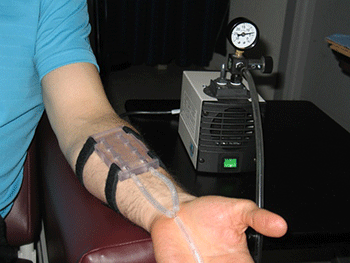How Much Sleep For Tissue Repair
A practiced night's sleep tin amend your mood, aid yous stay alert and heave your memory. Now data show that getting enough Z'due south might likewise go your cuts to heal more promptly. In fact, sleep was more than of import than adept nutrition in speeding wound healing.
This wasn't what scientists had expected to see.
They had hoped to show that giving people a nutritional boost would make their skin wounds heal faster — fifty-fifty in people who were sleep-deprived. That would have been useful for soldiers in gainsay, or for doctors working long shifts in a hospital. The scientists idea it should work because skilful nutrition keeps the body's immune system strong. That immune organization helps repair injuries and guards against infection.
Tracey Smith is a nutrition scientist at the U.S. Army Inquiry Constitute of Ecology Medicine, in Natick, Mass. She and her team studied 3 groups of healthy people who came to their laboratory to take part in tests. They gave each recruit pocket-sized peel wounds. Applying gentle suction on their forearms, they created blisters. Then they removed the tops of these blisters. (The procedure doesn't hurt, although it can be itchy, Smith says.)

Ane group of 16 volunteers got a normal amount of sleep — seven to nine hours a night. The other two groups of 20 people each were kept sleep deprived. They got only ii hours of sleep a night, for three nights in a row. To stay awake, the volunteers were asked to do things such equally walk, play video games, watch Television set, sit on an practice ball or play ping-pong. Throughout the experiment, 1 of the slumber-deprived groups got a nutritional drink with extra protein and vitamins. The other group got a placebo drinkable: It looked and tasted the aforementioned but had no actress nutrition.
Slumber clearly helped. People who slept unremarkably healed in almost iv.2 days. The sleep-deprived volunteers took about 5 days to heal.
And getting better nutrition offered no clear do good. Scientists sampled fluid from the wounds. The group that drank the nutritional supplement did show a stronger immune response at the wound. But that didn't speed the healing, Smith reports in the January Periodical of Applied Physiology.
What to make of the information
Sleep expert Clete Kushida didn't find the results all that surprising. He is a neurologist at Stanford Academy Medical Eye in California. The idea that lost slumber harms the immune system — and healing — "makes total sense," he says. Yet studies that have tried to examination this in people and animals showed mixed results.
Why didn't diet help healing fourth dimension? Smith can think of a few possibilities. The salubrious drinks may have helped a little — simply not plenty to show upward clearly in the relatively minor numbers of men and women tested here. In that location was likewise a big deviation in healing time betwixt individual participants, which could have fabricated it harder to run across a small effect due to nutrition.
For people who can't avoid lost sleep, scientists still don't take a nutritional way to aid them heal, Smith says. If you want to heal faster, your best bet for at present is to get more "vitamin Z."
How Much Sleep For Tissue Repair,
Source: https://www.sciencenewsforstudents.org/article/sleep-helps-wounds-heal-faster
Posted by: weaveryone1946.blogspot.com



0 Response to "How Much Sleep For Tissue Repair"
Post a Comment